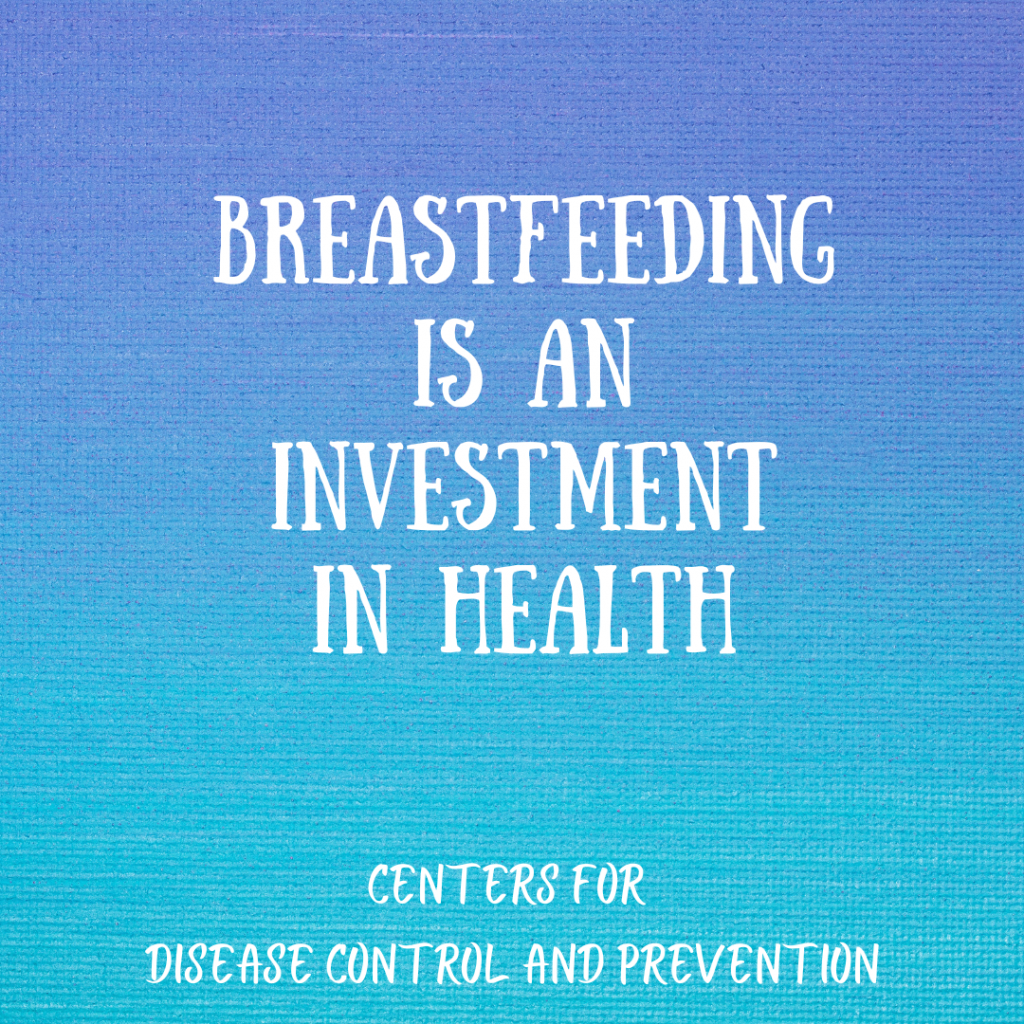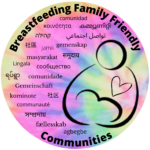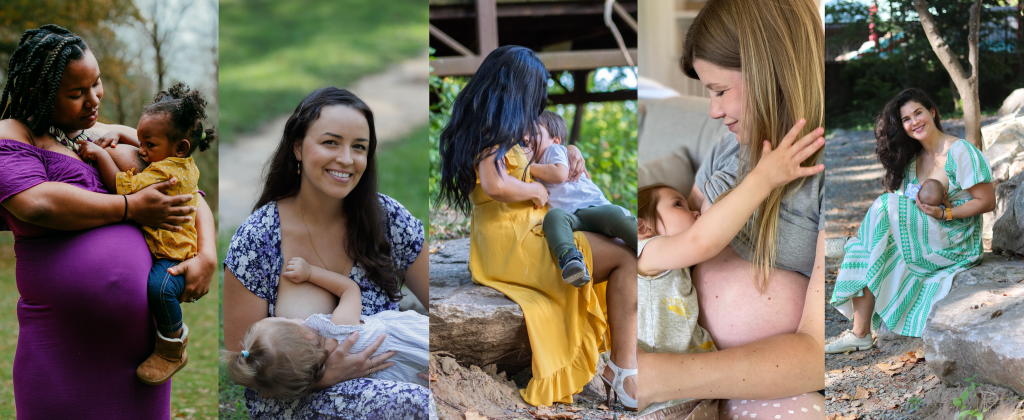October is Breast Cancer Awareness Month. Did you know that breastfeeding reduces the risk of breast cancer? A 2020 study found that less than half of the women in the U.S. know this, and surprisingly, that news is not always easy to find during this month. Many organizations, beyond breastfeeding advocacy groups, seem to avoid discussing the vital intersection of breastfeeding and breast cancer during Breast Cancer Awareness Month.
Cancer is scary. Just saying the word can bring fear – the heart beats faster, the stomach does a tumble. About 42,000 women and 500 men die each year from breast cancer, and the death rate for Black women is higher than for White women. We need to inform families about decisions that can impact breast cancer.
Breastfeeding, especially breastfeeding for a longer duration, lowers the risk of developing breast cancer. “The risk of breast cancer is reduced by 4.3% for every 12 months of breastfeeding, this is in addition to the 7.0% decrease in risk observed for each birth. Breastfeeding reduces the risk of Triple-Negative Breast Cancer (20%) and in carriers of BRCA1 mutations (22–55%).” (Stordal, 2022.) In a meta-analysis of subtypes of breast cancer, Islami and colleagues (2015) noted that their findings have “clear public health implications because receptor-negative breast cancers…are more common in younger women…generally have a poorer prognosis…and women with the highest risk of receptor-negative breast cancers, such as African-American women and BRCA1 carriers, can potentially benefit more from breastfeeding.” (Islami et al., 2015.)
Why does breastfeeding lower the risk of breast cancer? Many resources, such as Breastfeeding lowers your breast cancer risk (Cordeiro B, 2014), suggest a few ways that nursing can protect women. One is that the return of menstrual periods may be delayed due to the hormonal changes when nursing. This delay lowers the lifetime exposure to hormones like estrogen, which are linked to an increased risk of breast cancer. Another way is that women shed breast tissue while nursing (and during pregnancy), which helps the body to get rid of damaged cells that may develop cancer. Breastfeeding also matures or differentiates your cells in order to produce milk. This process may help cells resist becoming cancerous, and as Breastcancer.org’s Breastfeeding History suggests, “making milk 24/7 limits breast cells’ ability to misbehave.”
So why is breastfeeding not a banner on the National Breast Cancer Foundation Breast Cancer Awareness Month website? Why do so many women not know about this life saving benefit?
Could it be that society still considers breastfeeding to be a “lifestyle choice” rather than the norm for infant feeding? The Centers for Disease Control and Prevention (CDC) reminds us that “Breastfeeding is an Investment in Health, Not Just a Lifestyle Decision”, and breastfeeding initiation rates indicate that most families agree. In the 2022 CDC Breastfeeding Report Card, over 80% of infants born in 2019 started out receiving some breast milk, and at one month a little over 78% were still receiving breast milk. Although rates drop quickly after the first month and just over half of infants are receiving any breast milk at six months, these initiation rates indicate that breastfeeding is the “lifestyle” decision that parents want to make for their infants.

And speaking about infants, what might an infant say to the idea that breastfeeding is a lifestyle decision? Infants are born with an important reflex, the breast crawl. Infants have an instinctive need to seek the breast and to suckle. There is a reason for the reflex. Breastfeeding saves lives. Infants know it instinctively!
If not a lifestyle choice, could society’s attitude about breastfeeding be a reason for the reluctance to share information about the intersection of breastfeeding and breast cancer? The National Breast Cancer Foundation recognizes breastfeeding as a way to reduce the risk of breast cancer; however, unlike healthy eating and exercise, the information comes with a proviso. “Breastfeeding can reduce the risk of developing breast cancer, but [emphasis added] requires breastfeeding to be continuous for a relatively long time.” (National Breast Cancer Foundation, Inc.; October, 2022)
Why the “but”? While studies show that the longer a parent breastfeeds the greater the protection [from breast cancer], using the word “but” suggests that breastfeeding is too difficult or is an inconvenient way to lower one’s risk of breast cancer. Healthy eating and regular exercise also require a longer term commitment, and both can be inconvenient for some families and not feasible for families with limited resources. Yet, our language is supportive of those cancer protections without using limiting words such as “but.”
Just as healthy eating and exercise are not always easy, breastfeeding may not be easy. Does the difficulty rest totally with “breastfeeding”, or does the lack of community support for nursing families make it difficult for families to successfully nurse their children?
We learned from the Breastfeeding Report Card that the majority of parents intend to nurse, yet many stop in the early weeks and months. Our communities – families, friends, healthcare providers, employers, childcare providers, businesses, educational systems, governments – need to be there for nursing families! We can do this by:
- Taking the time to learn more, as individuals and as a society, about the importance of breastfeeding for the health of the infant, parent, and community.
- Ensuring that, while pregnant, families receive accurate lactation information from their healthcare providers, information that is not provided by infant formula manufacturers.
- Providing a welcoming community in which nursing families feel safe and comfortable feeding their children in all the places and spaces they go in the community,
- Supporting employers to create lactation supportive policies so that families can continue to chest/breastfeed after returning to work.
- Normalizing chest/breastfeeding in our schools with books and curricula that show chest/breastfeeding as the norm for infant feeding.
- Encouraging childcare programs to become breastfeeding friendly to help families continue to provide their milk, even when they are separated from their babies.
- Advocating for local, national, and global policies and practices that support chest/breastfeeding and access to human milk.
Can we shift the narrative, change the “but” to an “and”? It might look something like: “Breastfeeding can reduce the risk of developing breast cancer, and the longer you breastfeed, the greater the protection.” Can we support the family’s decision to breastfeed to give their child the optimal start in life and to promote the health of the parent! Our families, our infants, and our communities all benefit.
Learn More
- A Proclamation on National Breast Cancer Awareness Month, 2022.
- Anstey EH, Kincaid G. Breastfeeding for Cancer Prevention. Centers for Disease Control and Prevention. August 1, 2019.
- Breastcancer.org. Breastfeeding History. July 27, 2022.
- Breastfeeding Family Friendly Communities.
- Centers for Disease Control and Prevention.
- Breastfeeding | Breastfeeding Report Card United States 2022. August 31, 2022.
- Breastfeeding | Why It Matters. August 3, 2022.
- Breast Cancer | Basic Information About Breast Cancer. September 26, 2022.
- National Center for Health Statistics | Births Rose for the First Time in Seven Years in 2021. May 24, 2022.
- Why does breastfeeding lower your risk of breast cancer. Sep 10, 2018.
- Collaborative Group on Hormonal Factors in Breast Cancer. Breast cancer and breastfeeding: collaborative reanalysis of individual data from 47 epidemiological studies in 30 countries, including 50302 women with breast cancer and 96973 women without the disease. Lancet, 2002, Vol 360(9328), 187-195. DOI: https://doi.org/10.1016/S0140-6736(02)09454-0
- Cordeiro B. Breastfeeding lowers your breast cancer risk. The University of Texas. MD Anderson Cancer Clinic. 2014.
- Duffin E. Percentage of childless women in the United States in 2018, by age. Statistica. Oct 5, 2022.
- Islami F, Liu Y, Jemal A, .Zhou J, Weiderpass E, Colditz G, Boffetta P. Weiss M. Breastfeeding and breast cancer risk by receptor status—a systematic review and meta-analysis. Annals of Oncology, 2015, Vol. 26(12), 2398-2407. DOI: https://doi.org/10.1093/annonc/mdv379
- Stordal B. Breastfeeding reduces the risk of breast cancer: A call for action in high-income countries with low rates of breastfeeding. Cancer Medicine, 2022, 00:1-10. doi: 10.1002/cam4.5288
- Texas Health Resources. Breastfeeding | The Breast Crawl. 2022.
- UC Davis Health. Does breastfeeding lower mother’s breast cancer risk? November 2, 2020.
- Zhou Y, Chen J, Li Q, Huang W, Lan H, Jiang H. Association Between Breastfeeding and Breast Cancer Risk: Evidence from a Meta-analysis. Breastfeeding Medicine, 2015, Vol. 10(3). https://doi.org/10.1089/bfm.2014.0141

